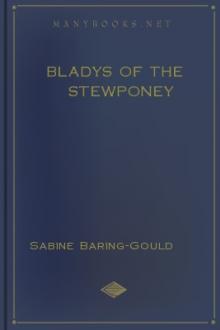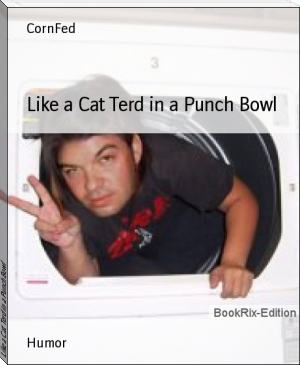The Broom-Squire - Sabine Baring-Gould (life books to read .txt) 📗

- Author: Sabine Baring-Gould
Book online «The Broom-Squire - Sabine Baring-Gould (life books to read .txt) 📗». Author Sabine Baring-Gould
"What do you say? A man murdered? Where? When? Are the murderers about?"
"They have run away."
"And what do you want me to do?"
"Would you mind taking in the poor little baby, and going to help Master Bideabout Kink to carry the body down."
"Where to? Not here. We don't want no bodies here."
The old fellow would have slammed the door in Iver's face had not the boy thrust in foot and knee.
Then a woman was heard calling, "What is that there, Jamaica? I hear a babe."
"Please, Mrs. Cheel, here is a poor little creature, the child of the murdered man, and it has no one to care for it," said the boy.
"A babe! Bless me! give the child to me," cried the woman. "Now then, Jamaica, bundle out of that, and let me get at the baby."
"No, I will not, Betsy," retorted the man designated Jamaica. "Why should I? Ask for an inch, and they'll have an ell. Stick in the toe of the baby, and they'll have the dead father after it. I don't want no corpses here."
"I will have the baby. I haven't set my eyes on a baby this hundred years."
"I say you shan't have nothing of the sort."
"I say I shall. If I choose to have a baby, who's to say me nay?"
"I say you nay. You shan't have no babies here."
"This is my house as much as yourn."
"I'm master I reckon."
"You are an old crabstick."
"You're an old broom-handle."
"Say that again."
"I say it."
"Now then--are you going to hit me?"
"I intend to."
Then the old man and his wife fell to fighting, clawing and battering each other, the woman screaming out that she would have a baby, the man that she should not.
Iver had managed to enter. The woman snatched at the child, the man wrenched it away from her. The boy was fain to escape outside and fly from the house with the child lest the babe should be torn in pieces between them. He knew old Cheel and his wife well by repute--for a couple ever quarrelling.
He now made his way to another house, one occupied by settlers of another family. There were here some sturdy sons and daughters.
When Iver had entered with the babe in his arms and had told his tale, the young people were full of excitement.
"Bill," said one of the lads to his brother, "I say! This is news. I'm off to see."
"I'll go along wi' you, Joe."
"How did they kill him?" asked one of the girls. "Did they punch him on the head?"
"Or cut his throat?" asked Bill.
"Joe!" called one of the girls, "I'll light the lantern, and we'll all go."
"Aye!" said the father, "these sort o' things don't happen but once in a lifetime."
"I wouldn't be out of seeing it for nuthin'," said the mother. "Did he die sudden like or take a long time about it?"
"I suppose they'll inquitch him," said one of the girls.
"There'll be some hanging come o' this," said one of the boys.
"Oh, my! There will be goings on," said the mother. "Dear life, I may never have such a chance again. Stay for me, Betsy Anne. I'm going to put on my clogs."
"Mother, I ain't agoing to wait for your clogs."
"Why not? He won't run away."
"And the baby?" asked Iver.
"Oh, bother the baby. We want to see the dead man."
"I wonder, now, where they'll take him to?" asked the mother. "Shall we have him here?"
"I don't mind," said the father. "Then he'll be inquitched here; but I don't want no baby."
"Nor do I nuther," said the woman. "Stay a moment, Betsy Anne! I'm coming. Oh, my! whatever have I done to my stocking, it's tore right across."
"Take the child to Bideabout," said one young man, "we want no babies here, but we'll have the corpse, and welcome. Folks will come and make a stir about that. But we won't have no babies. Take that child back where you found it."
"Babies!" said another, scornfully, "they come thick as blackberries, and bitter as sloes. But corpses--and they o' murdered men--them's coorosities."
"But the baby?" again asked the boy.
CHAPTER V.
MEHETABEL.
Iver stood in the open air with the child in his arms. He was perplexed. What should be done with it? He would have rubbed his head, to rub an idea into it, had not both his arms been engaged.
Large warm drops fell from the sky, like tears from an overcharged heart. The vault overhead was now black with rain clouds, and a flicker over the edge of the Punch-Bowl, like the quivering of expiring light in a despairing eye, gave evidence that a thunderstorm was gathering, and would speedily break.
The babe became peevish, and Iver was unable to pacify it.
He must find shelter somewhere, and every door was shut against the child. Had it not been that the storm was imminent, Iver would have hasted directly home, in full confidence that his tender-hearted mother would receive the rejected of the Broom-Squire, and the Ship Inn harbor what the Punch-Bowl refused to entertain.
He stumbled in the darkness to Jonas Kink's house, but finding the door locked, and that the rain was beginning to descend out of the clouds in rushes, he was obliged to take refuge in an out-house or barn--which the building was he could not distinguish. Here he was in absolute darkness. He did not venture to grope about, lest he should fall over some of the timber that might be, and probably was, collected there.
He supposed that he was in the place where Jonas fashioned his brooms, in which case the chopping block, the bundles of twigs, as well as the broom-sticks would be lying about. Bideabout was not an orderly and tidy worker, and his material would almost certainly be dispersed and strewn in such a manner as to trip up and throw down anyone unaccustomed to the place, and unprovided with a light.
The perspiration broke out on the boy's brow. The tears welled up in his eyes. He danced the infant in his arms, he addressed it caressingly, he scolded it. Then, in desperation, he laid it on the ground, and ran forth, through the rain, to the cottage of an old maid near, named Sally, stopping, however, at intervals in his career, to listen whether the child were still crying; but unable to decide, owing to the prolonged chime in his ears. It is not at once that the drums of hearing obtain relief, after that they have been set in vibration by acute clamor. On reaching the old maid's door he knocked.
For some time Sally remained irresponsive.
"I knows very well," said she to herself under the bedclothes, "it's that dratted boy who has been at the Rocliffe's."
Iver persisted in knocking. At length she appeared at the casement, opened it, thrust forth her nightcapped head, and said peevishly, "It ain't no manner o' use. I won't have no babies here, not to my time o' life, thank'y. I sez I won't, and wot I sez that I sticks to like toffee between the teeth. You may knock them there knuckles of yorn into dimples, but open I won't. I won't. I won't."
The old woman stamped on her bedroom floor.
"I do not ask that, Sally," pleaded the boy. "I have set the baby in Bideabout's barn, and there's no knowin', it may get hold of the chopper and hack off its limbs, or pull down all the rick o' broom-handles on Itself, or get smothered in the heather. I want a lantern. I don't know how to pacify the creature, and 'tis squeadling that terrible I don't know what's the matter."
"Is it a drawin' of the hind legs up, and stiffenin' of the back?" asked the old maid.
"I think so," answered the boy, dubiously; then, with further consideration, "I'm sure of it. It wriggled in my arms, like a worm when one's gettin' it on a hook out fishing."
"That's convulsions," said Sally. "'Twill go off in one of they, sure as eggs is eggs and ain't inions."
"Do you really say so?"
"It's that, or water on the brain. Wi' all this pouring rain, I shouldn't wonder if 'twasn't the tother. Not, you know, that I've any acquaintance wi babies. Only I've heard wimmin talk as has had 'em just like rabbits."
"Do they die when they have water on the brain?" asked the boy.
"Always. Babies can't stand it, no more nor can goslings gettin' their backs wetted."
"Don't you think that perhaps it's only hunger?"
"Can't say. Has the babe been a grabbin' and a clawin' at your nose, and a tryin' to suck it?"
"Once, Sally, when my nose got into the way."
"Then there's hunger too," said Sally, sententiously. "Them babies has terrible apertites, like canibals, and don't know what's good for 'em."
"Will you help me?" pleaded the boy. "Have you a feeding bottle?"
"Presarve and deliver us--I! What do you take me for, you imperant bye?"
"I think any medicine bottle would do, if well washed out. I shouldn't like, if there was any castor oil or senna tea dregs left, you know. But properly washed out, it might do, with a little milk in it."
"You'll choke the baby like that," said the old maid.
"I have seen how it is done. You stuff a bit of rag into the throat of the bottle, and leave a tip o' rag hanging out."
"Dare say, but you byes seems to understand these things better than I."
"Won't you come down and help me, Sally?"
"I'll come down presently when I've tumbled into some of my clothes."
Then the head disappeared, and the casement was shut.
After the lapse of a few minutes, a light appeared at the window of the lower room, and the door was slowly unlocked and unbarred.
Then the old woman appeared in the doorway. She wore her huge white-frilled nightcap, that fluttered in the wind about the shrivelled face it enclosed, but she presented an extremely limp and attenuated appearance in her person.
"I've been a turnin' over in my head," she said, "and ten chances to half-a-one, if that there child hev been squealin' so long, it's either broke a blood vessel, or will die o' 'plexy. There'll be a purty expense to the parish. There'll be two buryings laid on it that oughten't to be. That means an extra penny in the rates. If them there chaps wanted to murder a man, why didn't they go and do it in Hampshire, and not go a burdenin' of this county an' parish? There's rayson in everything."
"Do you really suppose the child will die?" asked the boy, more concerned about the life than about the rates.
"How can I say? I've had precious little to do wi' babies, thanks be. Now, sharp, what is it you want? I'm perishin' wi' cold."
"May I have a bottle and some





Comments (0)